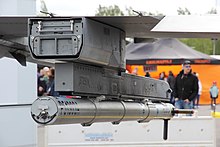| AN/ALE-50 | |
|---|---|
| Radar jamming and deception towed decoy | |
 ALE-50 towed decoy system in the upper part of an F-16 Fighting Falcon wing pylon ALE-50 towed decoy system in the upper part of an F-16 Fighting Falcon wing pylon | |
| Status | In use |
| Manufacturing Info | |
| Manufacturer | Raytheon |
| Introduced | 1995 (1995) |
| Production Period | 1995–2014 |
| No. Produced | >25,000 |
| Usage | |
| Used by Aircraft | |
| Used by Military | |
The AN/ALE-50 towed decoy system is an electronic countermeasure tool designed by Raytheon to protect multiple US military aircraft from air-to-air and surface-to-air radar-guided missiles. The AN/ALE-50 towed decoy system is an anti-missile countermeasures decoy system used on U.S. Air Force, Navy, and Marine Corps aircraft, and by certain non-United States air forces. The system is manufactured by Raytheon Space and Airborne Systems at its facility in Goleta, California. The ALE-50 system consists of a launcher and launch controller installed on the aircraft (usually on a wing pylon), and one or more expendable towed decoys. Each decoy is delivered in a sealed canister and has a ten-year shelf life.
When deployed, the decoy is towed behind the host aircraft, protecting the aircraft and its crew against RF-guided missiles by luring the missile toward the decoy and away from the intended target. In both flight tests and actual combat, the ALE-50 has successfully countered numerous live firings of both surface-to-air and air-to-air missiles. U.S. military pilots have nicknamed the decoy "Little Buddy". The system requires no threat-specific software, and communicates its health and status to the aircraft over a standard data bus.
Operational history
The ALE-50 was first deployed in 1995, but is also used on the F/A-18E/F Super Hornet and the B-1B Lancer. The ALE-50 has also been integrated into the next-generation AN/ALQ-184(V)9 ECM pod, creating an integrated threat-protection system that can be carried on a larger number of platforms.
The ALE-50 expendable decoys' estimated value is $22,000 each. A production run of 1,048 units were delivered through October 2010. An additional 226 units of ALE-50 Bravo T3F launchers were produced for U.S. Navy F/A-18 E/F aircraft in September 2014.
The ALE-50 towed decoy is currently operational on the F-16 Fighting Falcon, F/A-18E/F, and B-1B aircraft with more than 25,000 deliveries.
See also
References
- "Raytheon repairs towed decoys for Super Hornets". Shepard News. 8 December 2021. Archived from the original on 8 December 2021. Retrieved 3 January 2022.
- Colman, Ron (2001). "AN/ALE-50 Towed Decoy System". Raytheon Electronic Systems. Archived from the original on 4 January 2022. Retrieved 3 January 2022.
- ^ "Raytheon's ALE-50 "Little Buddy" Decoys". Defense Industry Daily.
- A.K., Trikha (March 2012). "Electronic Warfare - Countering Missile Threats". SP's Aviation. Archived from the original on 8 January 2022. Retrieved 8 January 2022.
- "Contracts". US Department of Defense. 22 April 2020. Archived from the original on 4 January 2022. Retrieved 3 January 2022.
- "Local Navy Contract Awards". Southern Maryland Online. 25 September 2014. Archived from the original on 15 November 2020. Retrieved 8 January 2022.
- Raytheon Product Information Page
- Keller, John (14 June 2019). "Raytheon to demonstrate electronic warfare (EW) towed decoy aircraft protection from radar-guided missiles". Military Aerospace Electronics. Archived from the original on 4 January 2022. Retrieved 3 January 2022.
| Electronic Warfare of the United States Armed Forces | |
|---|---|
| Active Countermeasures (Jamming) | |
| Passive Radar Warning Receivers | |
| Missile Warning Systems | |
| Flare and Chaff Sytems | |
| Directional IRCM | |
| Dedicated ECM / ESM aircraft | |
This military aviation article is a stub. You can help Misplaced Pages by expanding it. |